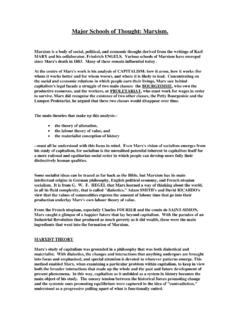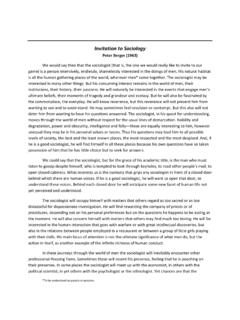Transcription of Deviance: Functionalist Explanations
1 Deviance: Functionalist Explanations Deviance: Functionalist Explanations 11 Deviance: Functionalist Explanations The Functionalist Explanation of Crime/22/11/999 1999 At times, a package deal is presented in which Functionalist , positivism, empiricism, evolutionism, and determinism are collectively linked with a consensus approach to social problems and a conservative approach to their solution. Downes and Rock, 1995 Being a peripheral and ad hoc modern day, Functionalist criminology may be represented as a somewhat piecemeal accumulation of arguments. It is not integrated, organised or coherent, and it has not been the subject of long debate.
2 Others may have criticised what it has done, but those who have been attacked have not usually turned round to amend, defend or clarify their work. Downes and Rock, 1995 Introduction: Sociologists concern with the study of deviance, like many other ideas, issues and concepts, can be traced back to the thinking of Emile Durkheim. But perhaps now we should ask whether the Functionalist analysis is still of value to sociologists. Looking at the quote, in other words much Functionalist theory has been found wanting in its explanation of society in recent years. It has become a routine concept folly for students to demolish before moving on towards more rewarding ground , to use the words of Downes and Rock.
3 The Use of Functionalism Yet despite this trend towards Functionalism bashing, its role in history of sociological debate is firmly secured. Equally its linkage with modern liberal and conservative-based approaches such as Neo-Functionalism and the New Right means that its history and heritage is still of relevance to the contemporary sociology syllabus. Why it is Not That Unlike other major theoretical perspectives such as Marxism, no specific Functionalist criminology exists to speak of, with its own individual interpretations of criminal statistics, the source of criminality and potential policy solutions. Rather functionalism takes a passing look at the issues of deviance in general, rather than crime in particular, while in the process trying to explain whole social problems and patterns.
4 The explanation of deviance is vital to this macro analysis but it does not contain the seeds of a break off into the distinctive field of criminology in its own right. Why it has not been While Functionalist criminology, especially in modern times, does not have a large, organised or particularly popular voice, this is not to say that within the work of Durkheim the concept of deviance has been ignored. Far from it. Equally, this is not to say that Functionalist analyses have not informed and shaped the development of non- Functionalist perspectives within criminology since the idea of anomie had a great influence on many British and USA sub-cultural studies from the 1920 s to the 1950 s.
5 Deviance: Functionalist Explanations Deviance: Functionalist Explanations 22It must be recognised that Durkheim s work as an individual does not represent the totality of Functionalist belief and equally the totality of Functionalist belief does not recognise necessarily all that Durkheim wrote. Why This Concern with Deviance for Durkheim Durkheim s major concern was with the analysis of social order; how stability is created and how the collective will is maintained in the face of individualism. These concerns were hardly surprising given the specific socio-cultural context within which Durkheim worked. During this work, Times were a changing and consequently so were the ways of seeing.
6 Thus, Durkheim s work was an attempt to engage with the problems of the era so solutions could be made. Important Writers Emile Durkheim Robert K Merton Hirschi Basic Ideas Deviance acts in a positive way to reinforce ideas of right and wrong in society Deviance provides work. Rather than looking at the individual, A Functionalist analysis of deviance begins with society as a whole. It looks for the source of deviance in the nature of society rather than the biological Explanations or psychological nature of the individual. Basic Much of the Functionalist approach stems from the work of Emile Durkheim, as we have already found out from education he believes in societies being held together by shared values, and economic interdependence.
7 There is always, according to Durkheim, the possibility of a collapse of society if its values are not constantly reaffirmed and passed on from one generation to another. Therefore, the maintenance of values is a crucial function of society. However, people do not always follow this collective conscience - they are naturally self-seeking and prefer to look after their own interests at the expense of others. What stops them is the law and learning from the institutions such as the education system the idea of collective conscience, and primary socialisation of the family. The law is the weaker of the two-socialisation agencies. Far stronger is the pervasive self control that we all learn.
8 However, in periods of great social strain or dramatic change, the power of the collective conscience is weakened. When Durkheim was writing for example, there was great fear that community life had been shattered by the growth of major cities and industrialisation. As the community collapsed under the weight of dramatic change brought about by industrialisation and urbanisation, so the collective conscience was weakened. Deviance: Functionalist Explanations Deviance: Functionalist Explanations 33 What Happens if the Collective Conscience Fails The result according to Durkheim, was the development of a state he called anomie. In essence, this means that people regard as unimportant the social expectations to respect the rights and the needs of others and prefer to look after their own interests even at their neighbours expense.
9 They return to their natural state of greed and self-interest. For society his heralds the long term collapse of order and harmony. Anomie, then, is dangerous and harmful to all. The Ways in Which Society can Reaffirm their Values and Ensure Social Cohesion There are a number of ways in which societies reaffirm their values and ensure continuing social cohesion. The most obvious ways Education: the teaching of a common language, history, social studies etc. Religion: through the process of collective worship of a common God. At first sight it seems strange that some functionalists should argue that deviance is a necessary part of all societies, and that it performs positive functions for the social system.
10 After all deviance break the norms and values of society. With the functionalists emphasis on the importance of shared norms and values as the basis of social order it would appear that deviance is a threat to social order, and therefore should be seen as a threat to society. All functionalists agree those social control mechanisms such as the police and the courts Other important writers who take a Functionalist perspective include, Merton, who further developed Strain Theory, and Hirshi. Emile Durkheim The Rules of Sociological Method Durkheim developed this argument with his discussion of crime in The Rules of Sociological Method. He argued that crime is an inevitable and normal aspect of social life.













